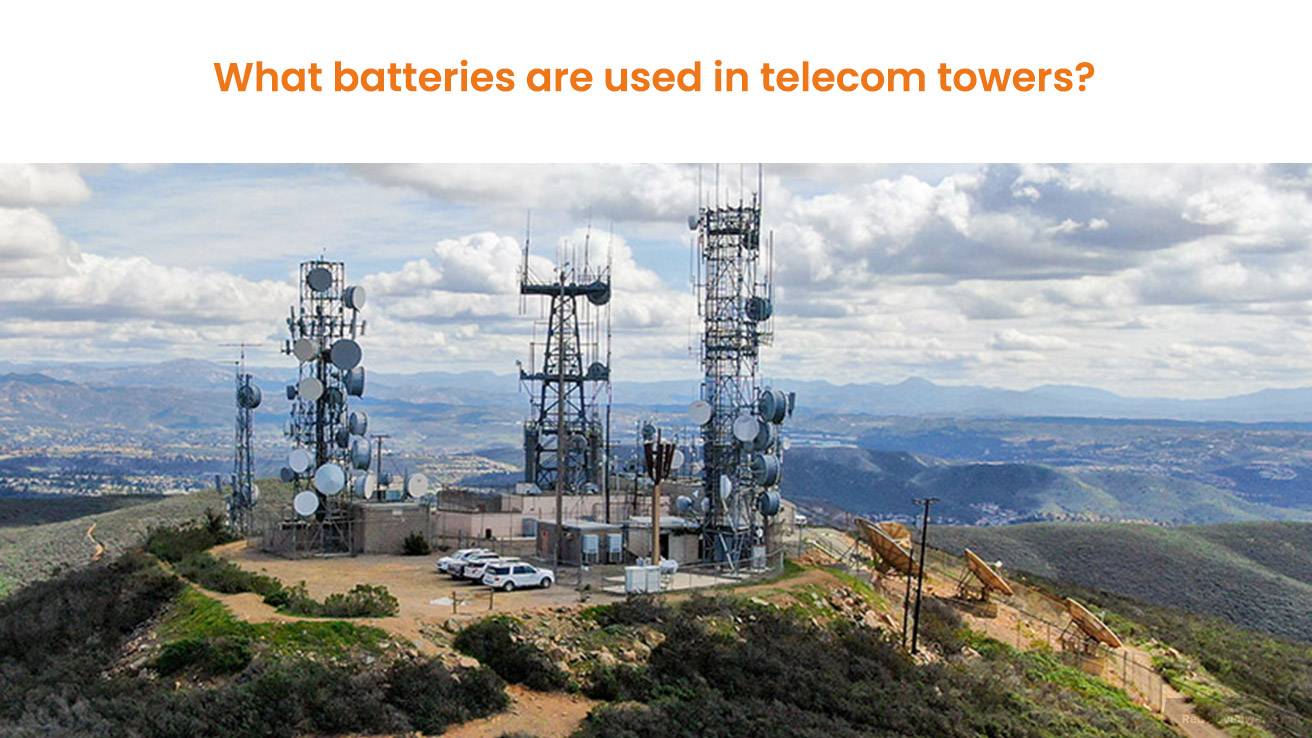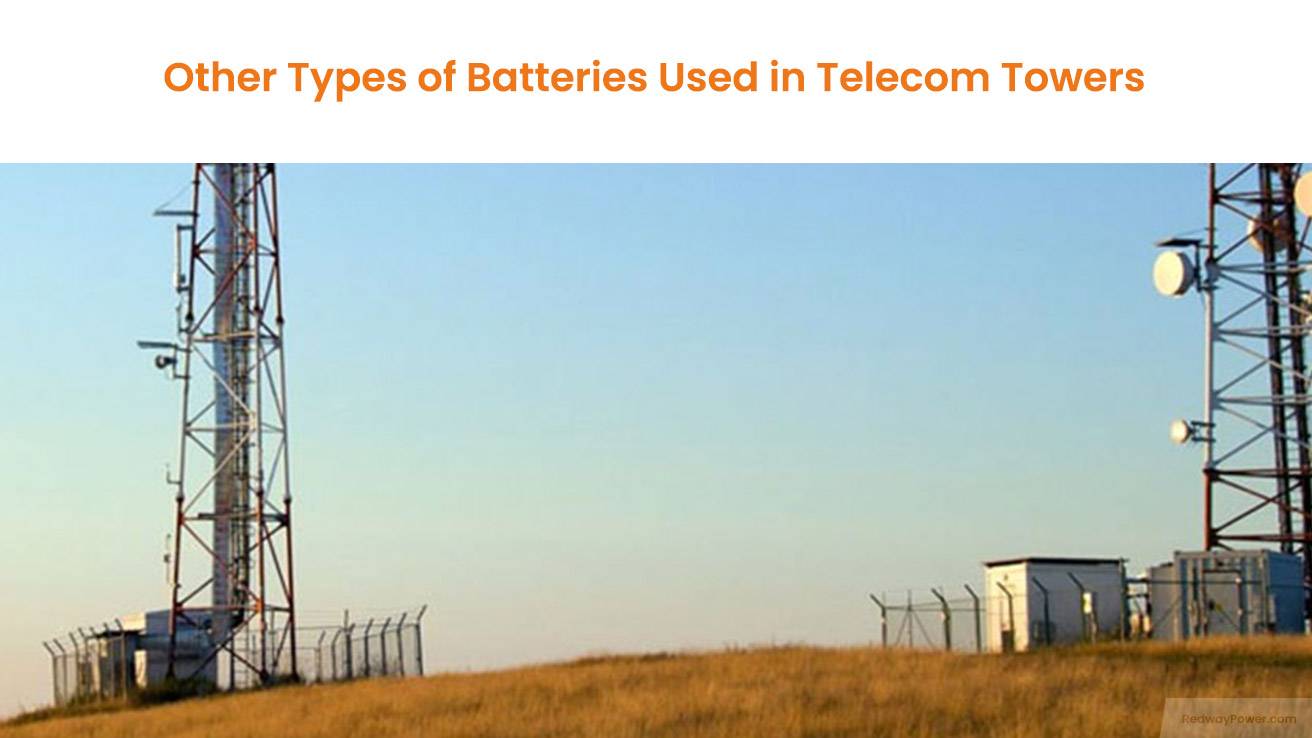
Blog
What Batteries Are Used in Telecom Towers?

Telecom towers utilize various battery types to ensure uninterrupted service during power outages and fluctuations. The most commonly used batteries include lead-acid, lithium-ion, nickel-cadmium, and nickel-metal hydride batteries, each offering unique advantages suited to different operational needs.
What Are Lithium Batteries For Telecom Towers?
Lithium batteries for telecom towers are advanced energy storage devices that provide reliable backup power for telecom infrastructure. They ensure continuous operation during power outages and support remote or off-grid locations by powering base stations and auxiliary equipment.
Why Use Lithium Batteries For Telecom Towers?
Lithium batteries are used because they offer high energy density, longer lifespan, faster charging, and lower maintenance compared to traditional lead-acid batteries. They save space and weight, reduce operational costs, and support environmental sustainability, making them ideal for powering telecom towers efficiently and reliably.
Lithium batteries are the preferred choice for telecom towers because they offer high energy density, allowing more power to be stored in a compact and lightweight form. This saves valuable space and reduces the overall weight of the power system, which is especially important in remote or space-limited tower sites. Their longer lifespan compared to traditional lead-acid batteries means fewer replacements over time, significantly lowering maintenance and operational costs. Additionally, lithium batteries support faster charging, ensuring that telecom towers can quickly recover power after outages or during peak usage periods, enhancing service reliability.
Beyond performance, lithium batteries contribute to environmental sustainability by reducing the need for frequent battery disposal and enabling integration with renewable energy sources like solar and wind. Their low maintenance requirements eliminate the need for regular servicing such as watering or equalizing, which further cuts down on operational expenses and downtime. These combined benefits make lithium batteries an efficient, reliable, and eco-friendly solution for powering telecom towers, ensuring continuous communication services in a cost-effective manner.
How Do Lithium Batteries Benefit Telecom Towers?
Lithium batteries benefit telecom towers by delivering stable, uninterrupted backup power, enabling fast recharge during outages, and reducing downtime. Their long lifespan and efficiency lower maintenance and replacement costs, while their compact size and environmental friendliness enhance overall tower performance and sustainability.
Lithium batteries benefit telecom towers by providing stable, uninterrupted backup power that ensures continuous operation during power outages, minimizing downtime and service disruptions. Their ability to recharge quickly allows telecom towers to recover power swiftly after an outage, maintaining network reliability. The long lifespan and high efficiency of lithium batteries significantly reduce the need for frequent maintenance and costly replacements, lowering overall operational expenses for telecom operators.
Additionally, lithium batteries’ compact size makes them ideal for space-constrained tower sites, allowing for easier installation and scalability as network demands grow. Their environmental friendliness, due to higher energy efficiency and compatibility with renewable energy sources, enhances the sustainability of telecom infrastructure. These benefits collectively improve the performance, cost-effectiveness, and ecological impact of telecom towers, supporting the evolving needs of modern communication networks.
What Types of Batteries Are Commonly Used in Telecom Towers?
Telecom towers typically use several types of batteries, including:
- Lead-Acid Batteries: These are the traditional choice due to their low cost and high reliability. They are often used for backup power but require regular maintenance.
- Lithium-Ion Batteries: Gaining popularity due to their higher energy density, longer lifespan, and reduced maintenance needs.
- Nickel-Cadmium (Ni-Cd) Batteries: Known for their durability and ability to perform well in extreme temperatures.
- Nickel-Metal Hydride (Ni-MH) Batteries: Offering higher energy density than Ni-Cd batteries, they are also used but less commonly than lithium-ion.
Chart: Comparison of Battery Types Used in Telecom Towers
| Battery Type | Advantages | Disadvantages |
|---|---|---|
| Lead-Acid | Low cost, high reliability | Requires maintenance, shorter lifespan |
| Lithium-Ion | High energy density, longer lifespan | Higher initial cost, safety concerns |
| Nickel-Cadmium (Ni-Cd) | Durable, performs well in extreme conditions | Lower energy density than lithium-ion |
| Nickel-Metal Hydride (Ni-MH) | Higher energy density than Ni-Cd | More expensive than Ni-Cd |
How Do Lithium-Ion Batteries Compare to Lead-Acid Batteries for Telecom Use?
Lithium-ion batteries are increasingly preferred over lead-acid batteries in telecom applications due to several factors:
- Energy Density: Lithium-ion batteries have a higher energy density, allowing them to store more energy in a smaller footprint.
- Lifespan: They typically last longer than lead-acid batteries, reducing replacement frequency and costs.
- Maintenance: Lithium-ion batteries require less maintenance compared to lead-acid options.
Chart: Performance Comparison Between Lithium-Ion and Lead-Acid Batteries
| Feature | Lithium-Ion | Lead-Acid |
|---|---|---|
| Energy Density | Higher | Lower |
| Lifespan | Longer (up to 10 years) | Shorter (3-5 years) |
| Maintenance Needs | Minimal | Regular maintenance required |
What Are the Advantages of Using Nickel-Cadmium and Nickel-Metal Hydride Batteries?
Nickel-cadmium (Ni-Cd) and nickel-metal hydride (Ni-MH) batteries offer specific advantages:
- Ni-Cd Batteries: Known for their robustness and ability to withstand deep discharges. They perform well in extreme temperatures but have lower energy density compared to lithium-ion.
- Ni-MH Batteries: Provide higher capacity than Ni-Cd batteries and are less toxic. However, they are not as widely used as lithium-ion due to cost considerations.
Chart: Advantages of Ni-Cd vs. Ni-MH Batteries
| Battery Type | Advantages |
|---|---|
| Nickel-Cadmium (Ni-Cd) | Robustness, deep discharge capability |
| Nickel-Metal Hydride (Ni-MH) | Higher capacity, lower toxicity |
How Do Environmental Conditions Affect Battery Performance in Telecom Towers?
Environmental conditions play a crucial role in battery performance:
- Temperature Extremes: Both high heat and freezing temperatures can negatively impact battery efficiency and lifespan. For instance, lead-acid batteries may suffer from sulfation at high temperatures.
- Humidity Levels: High humidity can lead to corrosion of battery terminals and connections, affecting performance.
Chart: Impact of Environmental Conditions on Battery Performance
| Condition | Effect on Performance |
|---|---|
| High Temperature | Can cause overheating and reduced lifespan |
| Low Temperature | Can reduce capacity and efficiency |
| High Humidity | Increases risk of corrosion |
What Best Practices Should Be Followed for Maintaining Batteries in Telecom Towers?
To ensure optimal performance and longevity of batteries used in telecom towers:
- Regular Inspections: Monitor battery health regularly to identify any issues early.
- Proper Ventilation: Ensure adequate ventilation around battery systems to prevent overheating.
- Clean Terminals: Keep battery terminals clean from corrosion to ensure good electrical contact.
- Follow Manufacturer Guidelines: Adhere strictly to the maintenance recommendations provided by battery manufacturers.
Tips for Battery Wholesale Buyers: How to Choose a Reliable Manufacturer?
When considering wholesale purchases or OEM orders for batteries, it’s crucial to choose a reliable manufacturer. Here are some tips:
- Research Manufacturer Reputation: Look for established companies like Redway Power, known for quality and reliability.
- Evaluate Product Range: Ensure they offer various battery types suitable for your needs.
- Check Certifications: Confirm compliance with industry standards.
For OEM orders from a reputable manufacturer like Redway Power, which has over 13 years of experience in lithium battery manufacturing, ensure clear communication regarding specifications and delivery timelines. This approach helps secure high-quality products that serve as excellent alternatives to lead-acid batteries.
Redway Power Expert Views
“Selecting the right battery type is crucial for the reliability of telecom towers. As technology advances, lithium-ion batteries are becoming the preferred choice due to their efficiency and lower maintenance requirements,” states an expert from Redway Power.
FAQ Section
- What types of batteries are used in telecom towers?
Telecom towers commonly use lead-acid, lithium-ion, nickel-cadmium, and nickel-metal hydride batteries. - Why are lithium-ion batteries preferred over lead-acid?
Lithium-ion batteries offer higher energy density, longer lifespan, and require less maintenance compared to lead-acid batteries. - How do environmental conditions affect telecom tower batteries?
Extreme temperatures and humidity levels can significantly impact battery performance and lifespan.




